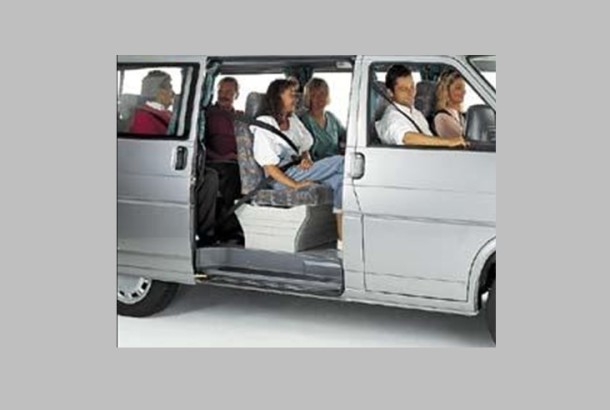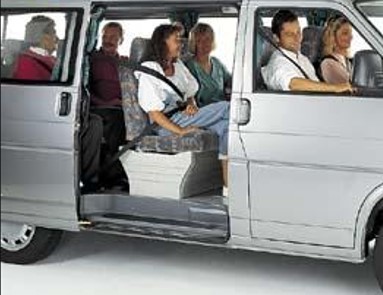
Safety
Historically the Light Commercial Vehicles(LCV) – ‘People Mover’ market has lagged behind passenger cars in terms of safety, but automotive brands are working hard to address the imbalance in this important vehicle segment.
The latest generation of LCV’s ‘People Mover’ feature the latest-generation electronic stability program, often including crosswind assist (which delivers single-sided braking to counter side gusts) and attention assist (which monitors driver fatigue) as standard, anti-lock braking, traction control and electronic brake force distribution with hydraulic brake assist, rollover mitigation, hill start assist, load adaptive control and more.
Other safety and convenience technologies of the latest generation of ‘People Movers’ include collision prevention assist (which gives visual and audio warnings of an impending collision with a vehicle ahead), lane-keeping assist, blind-spot assist, active parking assist (aids the driver in parallel and 90-degree parking situations) and a LED Intelligent Light System (this system sees the angle of beam dynamically altered to provide the best possible illumination across a variety of driving situations). Passive safety is also taken seriously, with crumple zones designed for improved pedestrian safety.
This type of vehicles is a smart proposition for for large families and chauffeur services. Passenger safety is taken care of by a full complement of airbags and the ISOFIX child-seat system, in the latest generation of LCV ‘People Mover’.
With regards to passenger safety, here is an overview of the most important points to watch:
Boarding
• Never allow passengers to board until the vehicle is at a complete standstill and safely parked by a pavement or traffic free area.
• Make sure the passengers enter the minibus from the pavement (unless using a ramp or lift at the rear). If the nearside door opens onto the road, take extra care.
• Ensure children are supervised when boarding, especially if they are using a rear door. Plan which passengers will sit in the front seats and by the doors.
• Take care when using passenger lifts and other specialist equipment. Always comply with the manufacturer’s instructions.
• Do not exceed the carrying capacity of the vehicle. Make sure everyone is sitting, one to a seat, and using seat belts.
• If school bus signs are used, make sure they are in position only while children are being transported, and that they do not obstruct your vision.
• Always ensure that ambulant disabled passengers are seated safely and comfortably and that passengers travelling in their wheelchairs are safely restrained. Wheelchairs not in use must be securely stored.
• Make sure you have a list of the passengers being carried and any medical or special needs. Keep it where it can be readily found in the event of an incident. Check passengers have any necessary medication with them.
• Check that no bags or clothing are caught in the doors, and check all mirrors every time before moving away in case latecomers are approaching the vehicle.
• Check that all luggage is secured and that gangways and exits are clear.
During the Journey
• Do not allow noisy or boisterous behavior.
• Enforce ‘No Smoking’ and ‘No Alcohol’ rules.
• Make sure all passengers are using their seat belts and wear your own seat belt.
Passenger Safety
• Make sure that head restraints are correctly adjusted. The top of the head restraint should be level with the top of the head and close to the back of the head.
• Do not allow child passengers to operate the doors and supervise any operation of the doors by responsible persons.
• Use hazard warning lights on school trips when children are boarding or leaving the vehicle.
• If there is a serious delay during the journey inform the school or organisation so that information may be passed to parents.
• Do not leave children unaccompanied in the vehicle.
• If you leave the vehicle, switch off the engine.
• If the vehicle breaks down, or if there is a collision, give clear instructions to the passengers and see that children remain together and supervised.
• If there is a risk of fire, however small, evacuate the minibus and move the passengers to a safe place.
At the End of the Journey
• Always park so that passengers step onto the foot-way and not the road.
• Never allow passengers to leave until the vehicle is at a complete standstill, and parked by a pavement or other traffic free area, with the hand brake engaged.
• Ensure passengers are supervised when leaving the vehicle, especially if they are using a rear exit.
• Avoid unnecessary reversing, but if it is unavoidable, seek adult assistance for direction, and ensure no one stands directly behind the vehicle.
• Do not leave children or vulnerable passengers alone if no one has arrived to collect them. Ensure you know what to do if a passenger is not collected.
sources: http://www.rospa.com/rospaweb/docs/advice-services/road-safety/practitioners/minibus-drivers-handbook.pdf; http://www.motoring.com.au/mercedes-benz-vito-and-valente-2015-review-52726/









